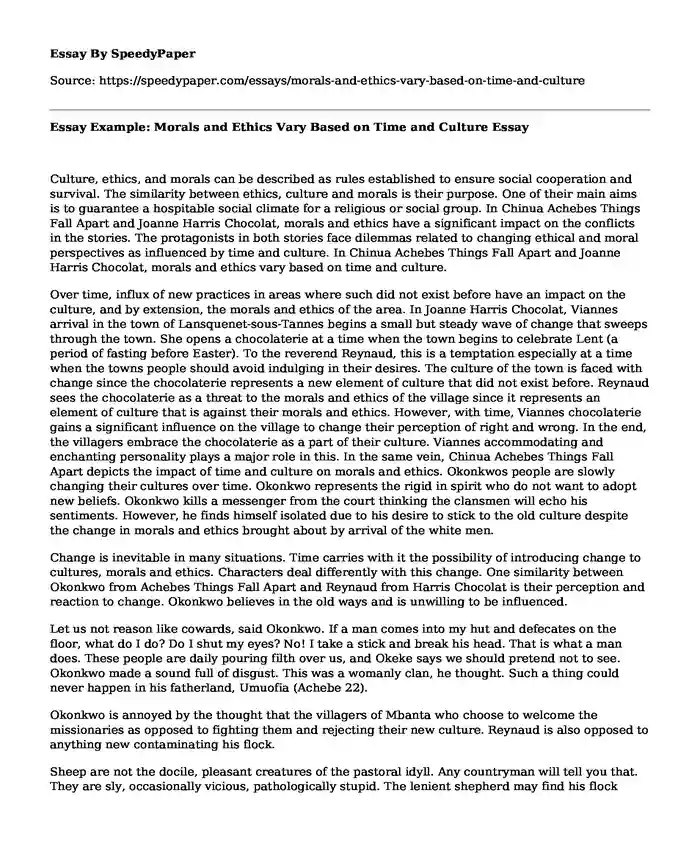
| Type of paper: | Essay |
| Categories: | Culture Literature Ethics |
| Pages: | 3 |
| Wordcount: | 750 words |
Culture, ethics, and morals can be described as rules established to ensure social cooperation and survival. The similarity between ethics, culture and morals is their purpose. One of their main aims is to guarantee a hospitable social climate for a religious or social group. In Chinua Achebes Things Fall Apart and Joanne Harris Chocolat, morals and ethics have a significant impact on the conflicts in the stories. The protagonists in both stories face dilemmas related to changing ethical and moral perspectives as influenced by time and culture. In Chinua Achebes Things Fall Apart and Joanne Harris Chocolat, morals and ethics vary based on time and culture.
Over time, influx of new practices in areas where such did not exist before have an impact on the culture, and by extension, the morals and ethics of the area. In Joanne Harris Chocolat, Viannes arrival in the town of Lansquenet-sous-Tannes begins a small but steady wave of change that sweeps through the town. She opens a chocolaterie at a time when the town begins to celebrate Lent (a period of fasting before Easter). To the reverend Reynaud, this is a temptation especially at a time when the towns people should avoid indulging in their desires. The culture of the town is faced with change since the chocolaterie represents a new element of culture that did not exist before. Reynaud sees the chocolaterie as a threat to the morals and ethics of the village since it represents an element of culture that is against their morals and ethics. However, with time, Viannes chocolaterie gains a significant influence on the village to change their perception of right and wrong. In the end, the villagers embrace the chocolaterie as a part of their culture. Viannes accommodating and enchanting personality plays a major role in this. In the same vein, Chinua Achebes Things Fall Apart depicts the impact of time and culture on morals and ethics. Okonkwos people are slowly changing their cultures over time. Okonkwo represents the rigid in spirit who do not want to adopt new beliefs. Okonkwo kills a messenger from the court thinking the clansmen will echo his sentiments. However, he finds himself isolated due to his desire to stick to the old culture despite the change in morals and ethics brought about by arrival of the white men.
Change is inevitable in many situations. Time carries with it the possibility of introducing change to cultures, morals and ethics. Characters deal differently with this change. One similarity between Okonkwo from Achebes Things Fall Apart and Reynaud from Harris Chocolat is their perception and reaction to change. Okonkwo believes in the old ways and is unwilling to be influenced.
Let us not reason like cowards, said Okonkwo. If a man comes into my hut and defecates on the floor, what do I do? Do I shut my eyes? No! I take a stick and break his head. That is what a man does. These people are daily pouring filth over us, and Okeke says we should pretend not to see. Okonkwo made a sound full of disgust. This was a womanly clan, he thought. Such a thing could never happen in his fatherland, Umuofia (Achebe 22).
Okonkwo is annoyed by the thought that the villagers of Mbanta who choose to welcome the missionaries as opposed to fighting them and rejecting their new culture. Reynaud is also opposed to anything new contaminating his flock.
Sheep are not the docile, pleasant creatures of the pastoral idyll. Any countryman will tell you that. They are sly, occasionally vicious, pathologically stupid. The lenient shepherd may find his flock unruly, defiant. I cannot afford to be lenient Harris (31).
Reynaud is against the chocolaterie and the indulgence it represents. Reynaud perceives Viannes shop as a symbol of debauchery and unacceptable deviance that would contaminate his flock. However, unlike Okonkwo who does not accept change and it leads to his death, Reynaud accepts change and embraces its influx into the morals and ethics of the community.
In Chinua Achebes Things Fall Apart and Joanne Harris Chocolat, morals and ethics vary based on time and culture. In Achebes Things Fall Apart, the missionaries lead to the introduction of new elements in culture that shape morals and ethics. Okonkwos downfall is due to his stubbornness in changing with the times. On the other hand, change in Harris Chocolat, is eventually accepted and the main characters embrace the new ways of life.
Works Cited
Chinua, Achebe. "Things fall apart." (1958).
Harris, Joanne. Chocolat. Vol. 26200. Random House Mondadori, 2010.
Cite this page
Essay Example: Morals and Ethics Vary Based on Time and Culture. (2019, Aug 15). Retrieved from https://speedypaper.com/essays/morals-and-ethics-vary-based-on-time-and-culture
Request Removal
If you are the original author of this essay and no longer wish to have it published on the SpeedyPaper website, please click below to request its removal:
- Essay Example on Why Use Social Media for Business
- Reasons for Tax Evasion Essay Example
- My Success Plan - Free Essay Example
- Leaving a Legacy - Free Essay Example
- Free essay sample for students: Juan Mata's blog analysis
- Essay Example American Censorship of Japanese Anime
- Essay Example: Mediation and Moderation
Popular categories




